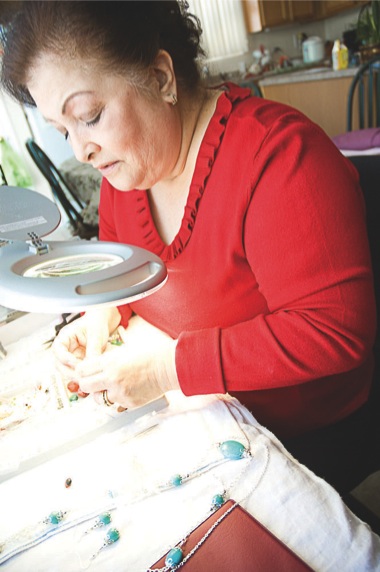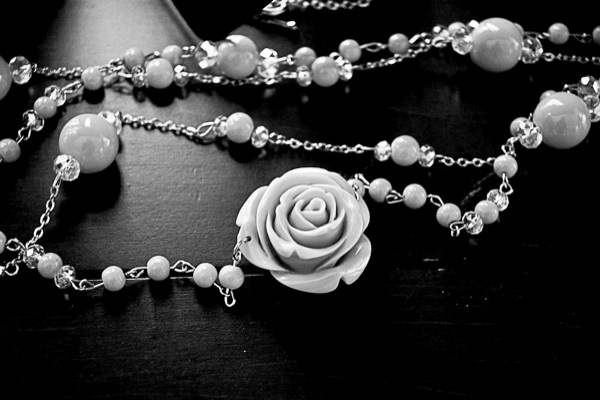SUN CITY – “…seven, eight, nine…ten, eleven,”
There were 11 links on the left side, therefore there must be 11 on the right as well.
“I count it so that way it can be perfect, you know?” Gladys H. Martinez Vega, N.31, said, explaining her method.

An accident at work in 2007 led Sun City resident Gladys Vega to making custom jewelry, in which she incorporates many of her skills that she learned working as a seamstress in her native country of Peru. (Photo by Chris LaPelusa/Sun Day)
These 11 links of silver belong to a necklace Gladys is making, one with a large turquoise stone as its centerpiece.
“She’s very picky. She’s not the one who goes, ‘Oh this is okay, boom!'” Gladys’ husband, Cesar A. Vega, said. “She likes to count all the chain holes. If it’s nine or ten, on the other side it has to be the same way so when they wear the necklace, it’s strong, it’s perfect.”
Sitting at her worktable, Gladys has all the supplies she needs: a necklace work board complete with measurements, various pliers and grips, a lamp and containers stacked with stones, beads, gems, and crystals inside.
Gladys amassed this toolbox of sparkle over time through wholesale markets. Her favorite item to use are Swarovski crystals; she makes special use of them for stretchable bracelets.
Some of Gladys’ materials come from a place a little more exotic. Reaching into one of her containers, she pulled out sterling silver from her home country of Peru.
“This is very gentle and soft,” she explained.
Silver has played a major role in shaping Peru. Known as “tears of the moon” by the ancient Incas, silver was associated with feminine qualities of the moon. Though recently surpassed by Mexico, Peru is the world’s second ranking producer of silver, having yielded 116 million ounces in 2010.

Vega’s work is meticulous to produce not only elegant but sturdy jewelry, like the necklace featured here, which is made of sterling silver and turquoise. (Photo by Chris LaPelusa/Sun Day)
Also among the imported goods Gladys uses are shell pieces and seeds, called Huayruro seeds, which grow in the Peruvian rainforest. The seeds, whose red and black color scheme resembles that of a ladybug, are said to bring good luck and keep negative energy away.
For all the materials Gladys incorporates into her work, there is at least one she avoids using.
“She doesn’t like to work with plastic, especially because a person that’s professional, in doing these types of jobs, will damage their reputation [by using plastic],” Cesar said.
Gladys showed how she transformed an ordinary piece of turquoise into a decorative element of the necklace, threading silver wire through the turquoise and matching decorative silver pieces and beads on each end. Finally, demonstrating the malleability of the Peruvian silver, she cuts and carefully bends the wire into a loop; it’s then ready to be added to the chain.
Contrary to the impressive displays of finished jewelry in her living and dining rooms, Gladys’ clientele is still very small and grows primarily on word-of-mouth.
“When she goes to see her doctor, the nurses or the secretary, they say, ‘Oh you’re making this, you’re making that, can you make [one] for me?’ So we show what she has and they buy,” Cesar Vega said.
“The bank people know us; everybody knows us,” Gladys added.
“Even the police know us,” Cesar joked.
Peru has provided Gladys more than just high-quality materials. It was there that she first learned her craft, having been taught by nuns to sew, knit, embroider, and create just about any type of clothing.
In Peru, Gladys worked designing lingerie and delicates. She said the pieces would take an investment of considerable work and time, something shoppers do not seem to be fond of today.
“Now everybody says, ‘Why are you going to waste your time?’ But it’s not wasting time, it’s something that you create,” she said.
At 19, Gladys moved to Chicago, keeping her seamstress skills sharp by designing dresses and apparel. She kept her heritage in focus by maintaining a network of friends from South American descent. She proudly flipped through photos of her and Cesar performing the Marinera, a traditional Peruvian folk dance.
Gladys and Cesar often collaborate, as Cesar is a gifted artist. For example, when Gladys designed bridesmaid dresses, Cesar would draw out the designs so clients could see them first. Gladys said this helped prevent fussy bridesmaids with dresses that looked different from what they expected.
It was an unfortunate accident that led Gladys to designing jewelry, however. In 2007, Gladys suffered an injury while lifting an item at work. What followed was a series of doctors, procedures, and surgeries that left Gladys in arguably worse shape than when she started.
Her limited mobility and pain were not enough to keep her sitting, however. She continued to work until 2010 and continues to walk on her own when she can.
“With all my pain, with all my surgeries, all my problems I’ve got, I push myself to do all this,” Gladys said.
The jewelry Gladys creates is more than a collection of jewels, beads, and metals designed to catch the eye. They are the proud work of a woman who has refused to let injury and suffering place the final link in her creative chain.




